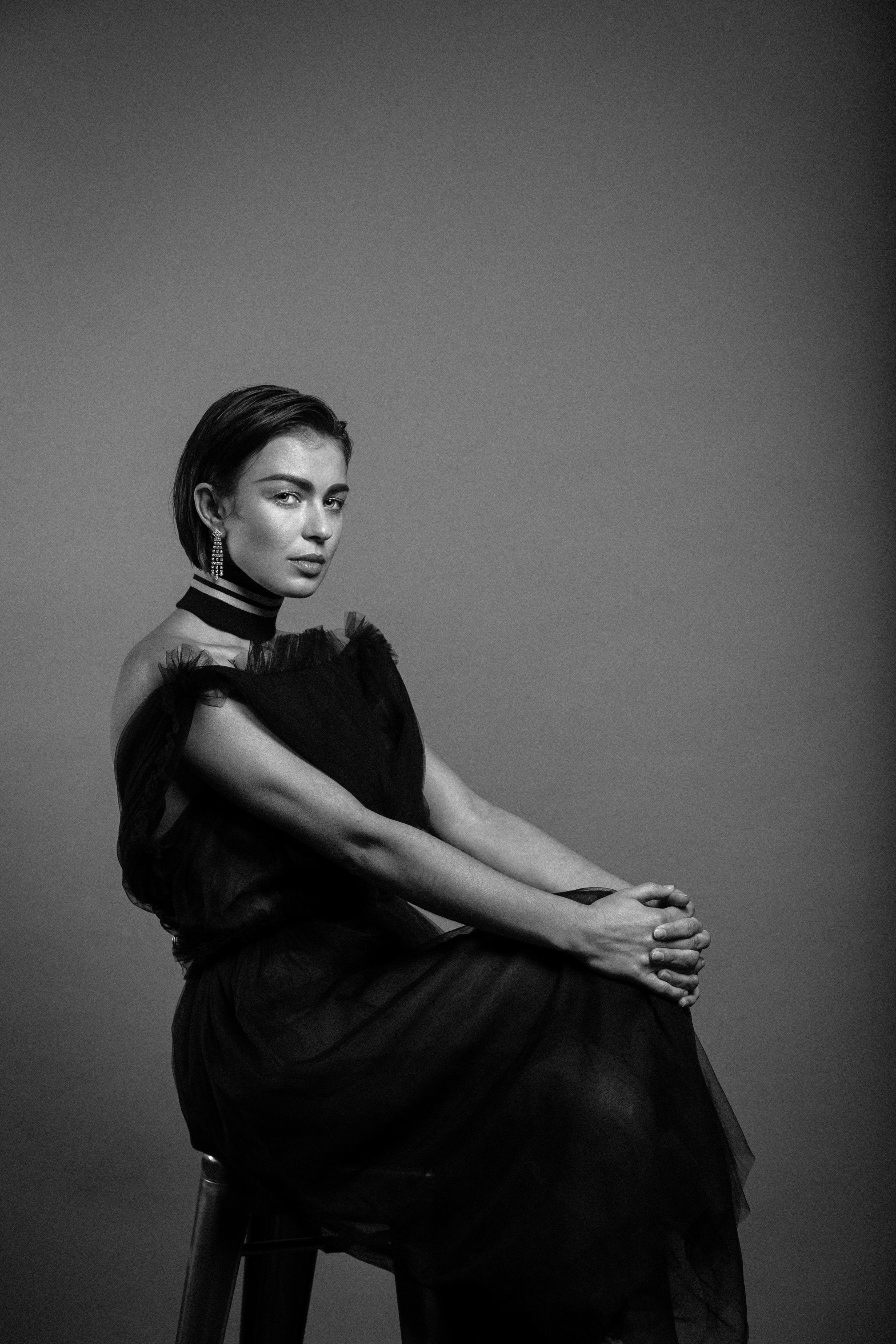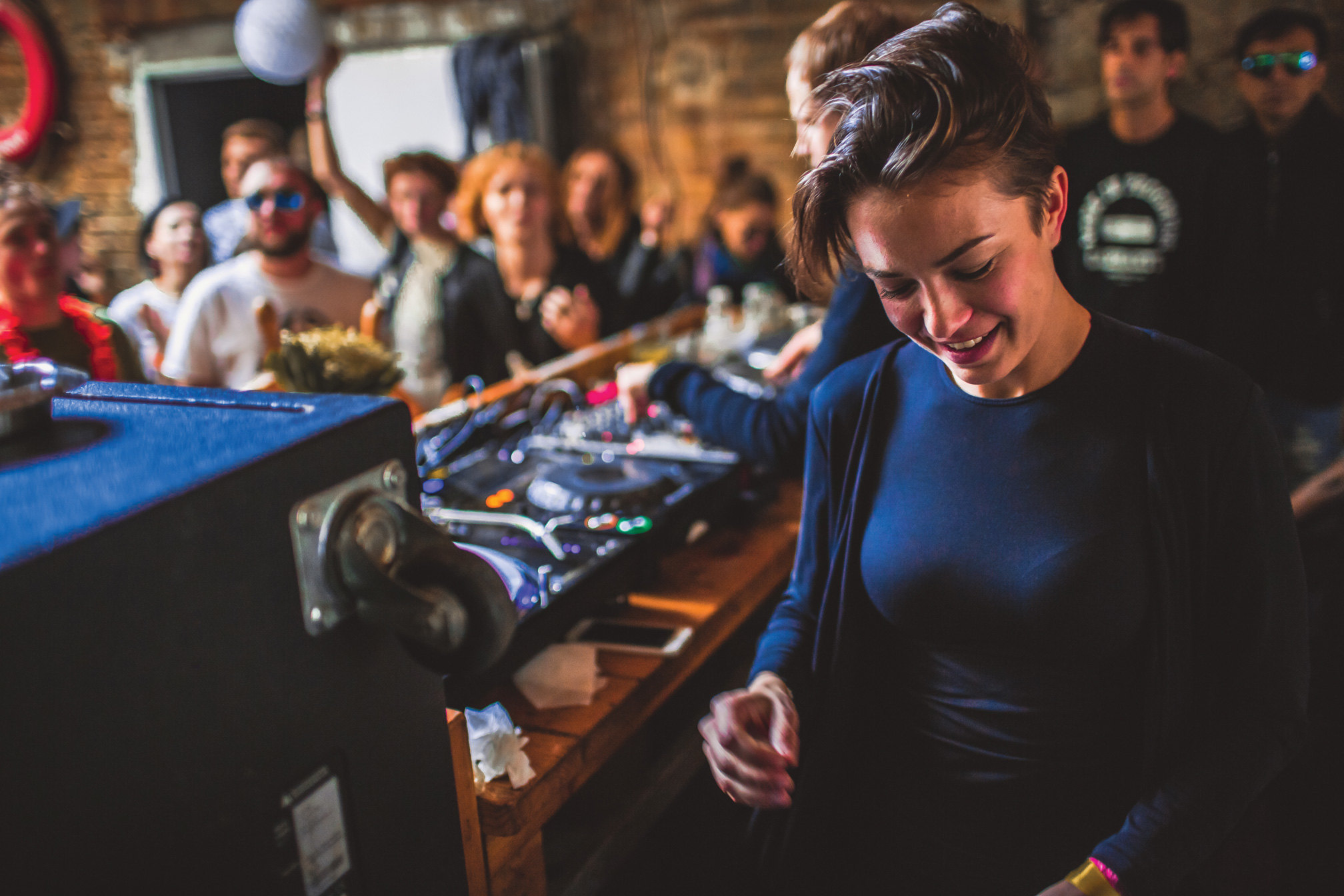 Cover stars
Cover stars
Nastia: A new star rises
Complex, fearless and innovative – with a love/hate relationship with DJing and success
It’s a sunny April afternoon at Caprices Festival 2016 in the Swiss Alps and Nastia takes to the stage in a packed tent, her ‘Are You Gluten Free?’ T-shirt poking fun at the dietary trend du jour. Today seems no different to the 131 other gigs that she’ll play this year, except that manager Miguel is trying out a new streaming function, Facebook Live, introduced the day before. As the 29-year-old Ukrainian kicks off
a set spanning percussive tech-house, lithe techno and breakbeat, playing off vinyl and USB, Miguel begins to film. Within minutes he’s nudging her in disbelief as the views, comments and Likes begin to trickle into a flood of hundreds and then thousands. Thanks to a trick of light on the CDJs’ display, a deluge of abuse comes in accusing her of faking her set. Handing over to the The Martinez Brothers, Nastia is still all smiles, but confronted with the online bile she fires back. “I really don’t take you serious [sic] cause it’s just ridiculous,” ends her comment online.
Fast-forward to 2017 and the ridiculousness has reached stellar new levels. Now up to 2.3 million views and 17,000 comments on the original video, Nastia is dance music’s most talked-about star. Taking January off to rest, 15 gigs in February proved that there’s no such thing as bad publicity – especially when the online ‘experts’ are so wrong, her mixing and track selection totally on point when she played Mixmag’s Lab LDN with a surprise set of drum ’n’ bass.
But Caprices was only the tip of the iceberg when it came to the ways in which social media transformed her life in 2016. From helping new love blossom and becoming a domestic celebrity to being vilified by the Ukrainian press and even made a political figure in her country’s ongoing undeclared war with Russia, Facebook touched every area. It brought recognition only a few achieve, but nearly cut her DJ career short.
“Everything I say you can use,” she tells us as we sit down to eat in the basement of Under Wonder, one of the best restaurants in her native Kiev. It’s not what we’re used to when it comes to artist interviews. Having met us in the icy, minus-7 conditions wearing an thin black wool jacket, only an upturned collar protecting her neck, inside the restaurant she wears a simple combo of black jumper, black jeans and boots as she helps us navigate the menu. Nastia has made it a habit to uncover the uncomfortable underbelly of life as a successful DJ, and while making the cover of Mixmag is, she says, a dream come true, she’s not sugaring the pill today.

“In the beginning DJing was a passion – I needed to do it,” she says as we wait for our food. “Now, it’s the opposite. It’s my work, and I make enough money with that, but I don’t enjoy it as much as I did.”
In an industry obsessed with numbers, where more plays and bigger shows equates to success, this admission might sound ungrateful – but for Nastia success has served as an awakening to other priorities. It doesn’t mean that she’s stopped enjoying DJing entirely, or performs with any less of the fearless eclecticism and energy that’s won fans from Richie Hawtin to R&S founder Renaat Vandepapeliere. She talks passionately of the joy of playing outside in Brisbane on her debut tour of Australia, and wandering around Melbourne admiring the architecture and soaking up the mood. “It was a normal day for them, but for me it was an atmosphere of celebration,” she says, animatedly. “Cocoon Ibiza manager Johannes recalls her stunning debut last summer, too, demanding “More please, much more.”
Mixmag isn’t her first cover. In 2008 she appeared naked and pregnant with daughter Uliana on the cover of DJ Am, a Ukrainian magazine. Then she was still known as ‘DJ Beauty’, a name that gets to the heart of what her detractors are so desperate to believe: that Nastia got to where she is because of her looks, rather than the talent that made her a resident at Kazantip for five years. The fact is, she did enter the Miss Ukraine 2007 representing Donetsk. Having watched the competition back on YouTube, it feels “like a different person”, she tells us now, her demeanour switching between emotional intensity and a playful sense of humour. “I was knocked out in the first round,” she adds with a laugh – though she also won an award voted for by the audience.
Adopting the name Nastia, shortened from her real name of Anastasia Topolskaia, rebranded her in line with her actual talent, but it also helped usher in the claustrophobic effects of a highly successful DJ’s schedule. Even before Caprices, Nastia says she was struggling to come to terms with juggling at least three shows a week with being a single mother, the highs and lows of which have been a regular part of her warts-and-all Facebook feed. Falling into a deep depression at the end of 2015, for a few weeks back in Kiev she rented a flat next to her own where she could seek solitude, not having the energy to even speak to friends. “I didn’t want to have my own things around me, I was just working on podcasts,” she said.

Reading Russian novel The Brothers Karamazov, the last book by Dostoyevsky, an author she’d studied at school and resolved to re-read in chronological order, pulled her out of it. It also steeled her against the first wave of unexpected attention that marked a turbulent year. “Maybe you should fight for your reputation,” she says now about her seemingly unanswerable critics, “but sometimes it’s stupid to fight with people who don’t listen. Anything you do, it’s not going to be good enough for them.”
While we’re drinking tea Nastia’s fiancé, Serhiy Leshchenko, arrives. They met in March and he proposed to her on the steps of Rome’s Piazza di Spagna before her New Year’s Eve gig. With the height of a basketball player, a short dark beard and hair, and glasses, the 36-year-old is famous for his career as an investigative journalist writing about corruption in Ukraine, and became an MP in 2014. A lifelong electronic music fan (we spot a signed copy of Plastikman’s ‘Sheet One’ in his car when Nastia gives us a lift in it), the pair met at a party. When Nastia went on tour to Brazil afterwards they spent every waking hour talking on Facebook chat. “I came back on the thirtieth of May and on midnight of the thirty-first we met in a park to catch up in real life.”
Announcing their relationship also via Facebook turned out to be the very definition of ‘It’s Complicated’. Despite having been a member of the ruling Petro Poroshenko Bloc, the eponymous party of the president, Sergii’s criticism of Poroshenko, a billionaire businessman in the mould of Donald Trump, has made him a target for the media. “On the highest level of government they fight against him and try to look for scandals to use against him,” explains Nastia. She found herself embroiled in September when he was accused of corruption after the pair bought a flat in the centre of Ukraine, the media questioning how he could afford it. Nastia revealed her own considerable earnings to begrudging respect, not just for her but DJing in general, and became a national celebrity. Newspapers and TV channels lined up to interview her, the English-speaking Kiev Post labelling her one of the country’s ‘Top 30 Under 30 Young Leaders’.
Her openness became an issue. With everything on her personal Facebook page appearing in the media, in December she wrote a post on her disgust at the celebratory mood in Ukraine following a plane crash in Russia. “I couldn’t stand it any more,” she says as Serhiy sits quietly with his arm around her. “You shouldn’t be happy when people die, even if it’s the country we’re at war with. How you can judge them if you behave the same?” The story spiralled, even reaching the news in Russia. “I had dinner with my friends and they said, ‘there are only a few brave people who can talk about that’. My friends feel the same, but they can never make a post about it because they are afraid.”

It’s wasn’t without fallout. After Russia invaded the Crimea, Nastia, a Russian-speaker herself, refused to play there except for her residency at Arma17, the underground club where she forged the identity she has today. “It’s like my family,” she smiles, labelling inspirational founder Natasha Abelle “a bright star in the sky that you follow.” But with her relationship with Serhiy in the open, she had to give even this up. “It’s not safe any more to go to Russia. They could put drugs in my bag, then stop me and put me in jail to get to him,” she says. She’s even unable to visit her father, who still lives in the village that she was born in, or two sisters, all of whom live in Russian-occupied territory.
“I used to believe Ukrainian people are much better than Russians, but they’re behaving the same way,” she says, despite empathising with Ukraine’s anger and describing Russia’s tactics as something “from two centuries ago”. She insists she’ll never stop speaking out, but for now her personal page is restricted to photos, and the Ukrainian papers are uninterested in her official artist page. “You shut up, no problems. But I don’t know how long that I can do this.”
Late the next night, we’re in another 24-hour restaurant discussing the possible answer. Nastia announces that in a year and a half she wants to have another baby and take a break. She wants at least three children, her intention to adopt the third. “I don’t know if I’m going to come back, but if I do it’ll be totally different. I need to switch off, to stop listening to everything. Then I need to start again from zero. I need to be clear if I’m doing something real.”
If she’s in doubt about what’s real, it’s because everywhere she looks she sees easy, empty fixes. “The DJ plays for two hours and it sounds like one track, with a few effects.” Naming various headlining acts she believes rose to fame with a distinctive, exciting sound, then abandoned it for the same main-room fodder as everyone, she then names Helena Hauff and Margaret Dygas as pushing the uncompromising, experimental sound she’s now constantly striving for herself – sometimes alienating her audience doing so. “I respect producers who express themselves in a weird way: music you don’t expect to hear and which is difficult to understand.”

It’s this affinity for new and out-there music that’s brought her close to Renaat, someone who has been a huge influence since they first met on an ADE panel. “That’s why he discovered James Blake and released Aphex Twin,” she says, explaining how she has a library of books, like Laurent Garnier’s ‘Electrochoc’, to also try and fill in the formative years that she missed. “He doesn’t like to look back. ‘That music I’ve experienced, it’s not interesting to me any more.’”
Having tipped her performances amongst his favourite for the last two years, Renaat is equally glowing, telling us that some people are born DJs. “You do what you want,” he advised her before her first appearance for R&S. “It was a massive set, really incredible and I told her, don’t listen to anyone.” She’s taken this to heart, delivering minimal half-time d’n’b when B.Traits asked for a series of podcasts for Radio 1, a set of broken rhythms for her Mixmag mix and indefinitely stalling the podcast RA asked her to do “until I have the music to match the concept in my head.” Add to this agenda-setting attitude her own Propaganda label and two weekly shows for Kiss FM and Ibiza Sonica, and Nastia has built a platform
to take over the world.
Yet she knows how transient it all is. “Your career is like dust: today you have it, tomorrow it’s gone,” she says bluntly – and she describes the many unhappy DJs she sees trapped playing music they don’t like at parties they don’t want to be at because it’s the only way they know to make money. “It doesn’t even give you real friends,” she adds, telling us she can count hers outside Ukraine on one hand. It’s what makes her annual Strichka festival, where she’s surrounded by friends in Kiev on her birthday, “my favourite project I’ve done in my career.” She can envisage rising through the ranks even further – but only on her own terms. “My life is complete now,” she says over dessert. “I have everything I want, I have everything I need. I don’t want to fight any more, I don’t want to chase.”
Precisely what this means will doubtless become clear in time. Just when her star is brightest, Nastia may well bid farewell to DJing, at least temporarily – so bask in her light while you can. Her candid story, meanwhile, is a lesson for the entire industry. From tales of relationships imploding to the mental health issues suffered by Benga and Ben Pearce, the life of an eternally touring DJ takes its toll. A break might sound like commercial suicide, but if you’ve chosen to operate beyond the treadmill of disposable trends and forgettable DJ tools to fulfil your own vision of happiness, you’ll always be an inspiration to others.
The next Propaganda event will be February 16 at The Block Tel Aviv with Nastia, Rayo, Yate and TC80


